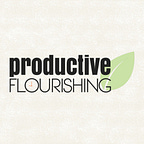Topics We Explored:
Angela Wheeler, PhD joins Charlie Gilkey on the show today to talk about how our connection to technology affects our connections and relationships with the people around us.
Together they discuss creating healthy boundaries with technology that allow us to focus more time on things that benefit us — as well as investing more in the relationships we already have, with the people who are most important to us.
Links and Resources Mentioned in This Episode:
Thanks for Listening!
Subscribe to Productive Flourishing on Apple Podcasts to get all the latest episodes delivered straight to your preferred mobile device. This is the perfect option for listening to the show in the car, on the subway, or while you’re working out. Plus, you won’t have to fuss with figuring out how you’re going to listen.
Episode Timestamps
[3:24] - We often set boundaries for our work and our relationships with other people, but sometimes we need to set boundaries for ourselves and our communication technology.
[5:27] - 25 years ago, before text messages and smartphones, there were different expectations around how people engaged with each other. With today’s technology, we can be in constant communication with people, but we feel more disconnected with people than when we didn’t talk to them all the time. There are also more expectations for instantaneous responses.
[8:45] - We used to go to the computer to complete specific tasks, like write a paper, or search for something specific on the web. After we were finished, we would turn the computer off and be done with it. Nowadays, we are always connected to a computer via smartphone or tablet, and even when we’re with other people, there’s always that device intruding into the conversation.
[12:20] - What is our connection to technology doing to our generation and future generations? Angela muses about how communication will change and how that will influence how connected people feel to each other. Today we are connected to so many more people in so many more ways because of technology, and while that can be a good thing, we’re often not connected to all those people on a deeper relational level than when we’re connected in person. On the flip side, being able to communicate from behind a screen has helped some more feel more comfortable.
[15:15] - There’s no real evidence that the technological connections we have with people have allowed us to exceed Dunbar’s number. Dunbar’s number states that once we get past 150 people, we can’t have meaningful connections with people. When it comes to today’s technology, this may mean that we are less strongly connected with the people that we are physically around, since we’re trying to be connected with so many people via our technology.
[19:20] - There are benefits of these communicative technologies, especially if you aren’t around people in your physical community that you can really relate to. Being able to connect via technology can help you find your tribe and people that you relate to even if they aren’t in the same place you are. There doesn’t necessarily need to be a distinction between these people and people you are physically connected to - it’s really more about how true to yourself you are in these relationships.
[21:30] - Multi-threading is more common with today’s technology than it was 25 years ago. We’re often doing something on our phones or computers while we’re watching a show or listening to a book. This could be where we’re experiencing the lack of connection, because sometimes it can feel like people can’t just slow down to be with you in that time. Charlie talks about his reasoning to get an Apple Watch and how this has helped him sort of get back to staying connected and keeping communicative technology separate and intentional.
[25:13] - We’re never really offline, and that has a tremendous impact on who we are as people and our ability to really show up when we’re meant to be somewhere. Never having technology off and away from you never allows you to be fully present in the moment. So much of our attention and our energy is being zapped from us all the time with technology. Angela talks about a client she had who would always check the news on her phone before she got out of bed, and she and Charlie talk about how this affects the rest of the day.
[29:55] - What fires together wires together, and just the act of touching our phones can lead to the chain of events that gets us invested in the news or social media on our phones. The more that we touch our phones and do the same things, the more we are priming ourselves to do that every time, even if that’s not originally why we grabbed our phones in the first place. If you are a person who is addicted to apps on the phone, you can remove them from your phone and see the change. If you turn it off, you can finally start to hear your own voice.
[33:43] - Charlie talks about a study that showed that the apps you use the most on your phone are actually the ones that make you the least happy, and those you use the least make you the most happy. The apps that people use most on their phones are social media apps. Typically when we aren’t feeling great we get on social media, where we are bombarded with people’s curated experiences or people expressing frustration or anger. It’s not always particularly uplifting.
[38:05] - Creating a boundary from digital technology by separating yourself from your phone and apps can be very powerful. It’s hard to do the work that matters if you’re constantly distracted by other people’s experiences or the news, etc. Instead you can focus on doing your best work and investing in the relationships you do have the strongest ties with. Being intentional about deciding to create this boundary is very a powerful choice.
[41:30] - Angela talks about the benefits of her decision to create some boundaries with technology. In the past month or so, as she’s separated herself from media, she’s going to bed earlier, exercising more, eating better, and reading stuff she actually wants to read. Many of us have habits associated with our consumption of passive media, and you can try to control those responses, or you can create a boundary that cuts those ties and gives you time to do more productive things.
[46:20] - For people who love social media and other communicative technology, that’s okay. Do a full audit to see if the benefit outweighs the other costs of using that technology. If it doesn’t, see what kind of choices you could make that could accomplish the same goals that could even create stronger connections.
[48:23] - The invitation/challenge for this week is to really take stock of the ways in which you’re using technology to be in connection with other people, and experiment with what it might be like to remove some of those from your daily flow.















